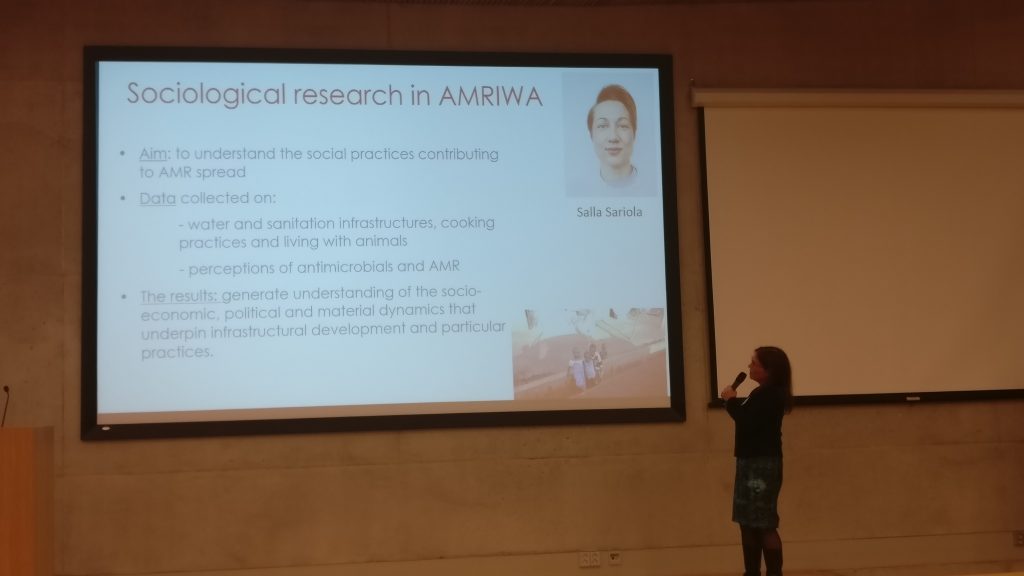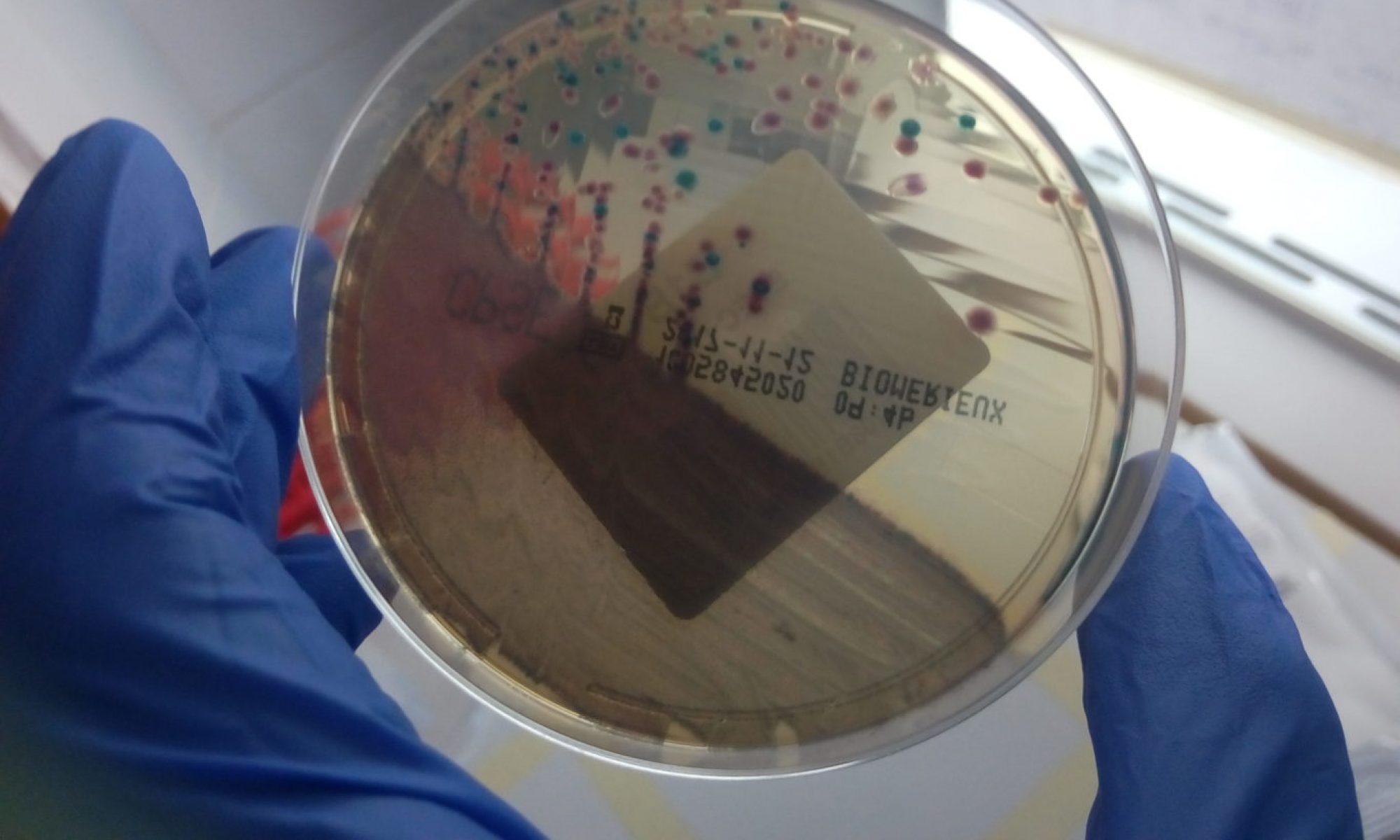
On Monday, 26th November 2018, Helsinki’s historical Paasitorni Congress Centre hosted the seminar Research to Make an Impact! I attended the seminar, along with AMRIWA team members Jose Canada, Kaisa Kaukka, Anniina Sarekoski, and PI Anu Kantele. This ‘kick-off’ seminar was organised by the Academy of Finland to display projects funded in the 2018-2022 call for the Academy Programme of Development Research, of which our project Occurrence, Sources and Prevention of Antimicrobial Resistance in West Africa forms a part. As a recent migrant to these academic shores, I found the day particularly useful not only for understanding more about the programme of development research that I am working within, but also to familiarise myself with Finnish funding structures, and the kinds of research being funded in this particular field.
Jointly managed between the Academy of Finland and the Ministry of Foreign Affairs Finland, the programme funds multidisciplinary problem-based research that targets global development challenges, for example programmes directed at improving health measures and food security, protecting biodiversity, strengthening the rights of women and minorities, and improving livelihoods and education. Projects are collaboratively designed with in-country academic and non-academic partners (industry, business, NGO sector). The overall aims of the programme align with Finland’s Development Policy Objectives, and the UN Sustainable Development Goals for eradicating poverty, inequality, and protecting natural resources. The programme’s principal research areas are:
- economic development in developing countries (jobs, livelihoods)
- creating a better-functioning society (welfare, health, education, human rights)
- food security, biodiversity, environmental health and natural resources
A condition of funding is the ability of projects to deliver demonstrable ‘impact’ in partner countries. Stated methods for achieving impact are strengthening partner research and technical capacities, and working towards the achievement of one or more of the SDGs. A further condition for funding is evidence of a human-rights-based approach to research, concretely addressing issues of inequality in gender and minorities, and unequal access to natural resources, healthcare and education.
Following the introductory words, the first Keynote, former president of Finland Tarja Halonen (2000-2012), opened the seminar with a speech emphasising the importance of social justice, protecting the rights of minorities, and our obligations to strengthen inclusiveness and democratic values within Europe and globally. Following President Halonen was political scientist and UNU-WIDER research fellow Rachael M. Gisselquist, who used her Keynote address to explore the space between applied and pure research—a space she calls ‘engaged frontier research’. Poised between the instrumental impact of applied research and the conceptual impact delivered by pure research, Dr Gisselquist defined the engaged frontier research are the ‘uncomfortable middle’, a delicate balancing of research and policy whereby impact is probable, but may be diverse, diffuse, and difficult to measure. Adequately measuring impact, she argued, involves moving away from reliance upon the tools of randomised impact evaluations towards analysis of when aid works and within what kinds of projects. Methods for achieving this include comparing contexts and outcomes, and analysis of how outcomes/findings carry or don’t carry across different contexts.
Following introductions and keynotes, delegates of the 12 2018-2022 projects were invited to give 15-minute presentations detailing their research objectives, methodologies, and proposed outcomes. The overwhelming majority of projects will be located in African nations, reflecting the history of collaboration Finnish academia has built with the continent. Projects targeted health, education, food and energy security, and environmental conservation. Scientists and engineers showcased their novel technologies and methodologies for tacking some of the challenges confronting emerging economies. These included:
- smart technologies for environmental and climate sensing, and improving food security
- integration of renewable energy sources into the Cuba’s power system
- technologies for improving grain safety through the binding mycotoxins in wholegrains to prevent absorption into the body
- novel methodologies for DNA and whole genome sequencing for detecting AMR genes and their lineages, and improving preparedness for managing emerging zoonotic infections
Representing AMRIWA, Anu Kantele gave an engaging presentation that emphasised the scale of the AMR problem, how our novel bioinformatics techniques can be applied to locate AMR hotspots, and the importance of the social and bioscience collaboration in designing interventions targeting use and pathways of transmission. Or at least it was clear to those of us in the project! I’m pretty sure the rationale and outcomes were clear to other participants as well. Other presentations in this segment (following coffee late afternoon) were the projects delivering technologies for improving grain safety and preparing to respond to emerging zoonotic infections, and the potential synergies with our work were clear.
Also on display was the strength of Finnish social sciences in leading research for strengthening development in low and middle-income countries, with projects examining opportunities and challenges for operationalising citizenship, educational pluralism, equality and democracy in transformative situations. Specific themes included access to education and employment, sustainable livelihoods, and water and climate vulnerability. Coming from the UK, I was struck by the number of social science-led projects receiving funding. The UK has a similar research programme, the Global Challenges Research Fund (GCRF), jointly managed by the Department for International Development (DfID) and Research Councils UK (RCUK). The fund aims to build research and innovation capacities in developing countries, and is thus driven by knowledge and technology transfers. As a consequence, the social sciences often remain instrumental to delivering technical outcomes rather than driving transformative research that renders visible and breaks down inequalities and uneven power structures between and within target communities, or research that examines perceptions of what development is and does. As an anthropologist and human geographer in the field of development studies, I was encouraged by the leadership Finland’s social sciences in this global field.
It was also encouraging to hear both presenters and members of the audience cautioning against ‘impact’ as a narrow short-term measure of socioeconomic improvement and programme success, emphasising instead the importance of establishing robust relationships that impactful endeavours can be built on, and observing the emergence of impact over longer time-scales, and within incidental or currently unknown sites.
Less clear, however, was evidence of an overall coherence to the Develop Programme. Granted, a delicious lunch, a post-seminar buffet and drinks gathering provided opportunities for participants to network and discuss potential synergies and collaborations, or to share experiences with those planning to submit proposals in future calls. Overall though, the seminar structure could have given more space to bringing themes together and exploring possible synergies during the sessions, demonstrating how the projects work together to meet the aims of the programme. Nevertheless, the ambitious themes the seminar addressed—development as a human right, delivering impact at the frontiers from the ‘uncomfortable middle’, and making instrumental use of Finnish scholarly and technical expertise, clearly signposted the direction of development research and interventions the Develop programme works towards, and the principles that guide it.
